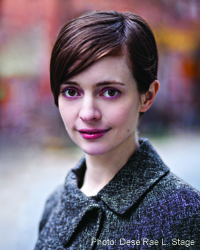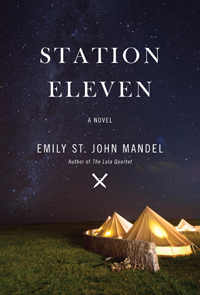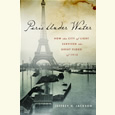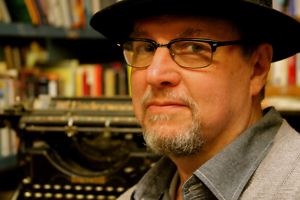All the World’s a Stage-Six Pandemic
Emily St. John Mandel talks with Chapter 16 about the role of art in what makes us human
While most contemporary writers of post-apocalyptic fiction can trace their literary lineage to Cormac McCarthy’s The Road, Emily St. John Mandel reached back to Shakespeare’s King Lear in writing her own bestselling novel, Station Eleven. A finalist for the National Book Award, Station Eleven never shows the actual collapse and ruin of civilization following a flu pandemic that kills off ninety-nine percent of the human population. Instead Mandel concentrates on telling a story that reveals the role of culture and art in preserving what makes us human and not simply scavenging automatons. What follows is a lightly edited excerpt from an interview with Mandel conducted during the 2014 Southern Festival of Books held in Nashville. Mandel will be in Nashville again on June 24, 2015, for the paperback release of Station Eleven.
 Chapter 16: Station Eleven begins with Jeevan Chaudhary attending a performance of King Lear in Toronto, and he knows something is amiss because Lear seems to be dying ahead of schedule.
Chapter 16: Station Eleven begins with Jeevan Chaudhary attending a performance of King Lear in Toronto, and he knows something is amiss because Lear seems to be dying ahead of schedule.
Emily St. John Mandel: Yes, and where I got that from is an oral history of the Public Theater in New York a couple of years ago. Just as kind of a throwaway comment, they said, “Oh, then there was that time when that guy dies of a heart attack in the title role of King Lear in the mad scene.” And I thought, “Oh my god, that’s an opener!” Yeah, so from the very beginning I had him dying on stage.
Chapter 16: And Jeevan can see this because he is training to be an EMT.
Mandel: Exactly. He’s sitting front-row center. He knows the play very well, so when Arthur Leander, who’s playing Lear, starts to fumble and skip back twelve lines; that alone tells Jeevan that something’s wrong. He’s training to be a paramedic because he’s been flailing around for his entire professional life trying to find a job that he doesn’t hate. It’s started to dawn on him that he could be doing something useful, at least, and try to find some enjoyment through that.
Chapter 16: Because previously Jeevan had been a paparazzo and an entertainment journalist. And beyond knowing King Lear, he had met Arthur Leander before, as well.
Mandel: He has. He’s mostly stalked Arthur Leander around Los Angeles when he was in the paparazzi. Jeevan is from Toronto originally and kind of burns out on Los Angeles and the paparazzi life, which I think must be a really easy world to burn out in. He goes home because one of his parents is sick. I think I actually wrote that detail out of the book, but that’s the backstory I had in mind. A run of performances of King Lear comes into town, and Arthur Leander is in the title role. He’s finally old enough to play Lear, which has been something he’s wanted his whole life. So Jeevan gets tickets to go see this guy he knew in Los Angeles.
Chapter 16: This show offers him not only a chance to see someone he’s been fascinated with for years, but Jeevan and his partner Laura have been having a terrible time of it, so this is an opportunity for a romantic reconciliation at the theater.
Mandel: It’s an effort to have a nice night out on the town, since all they do is fight at this point. I’ve wondered if that’s maybe a slightly cowardly move on my part because he does lose Laura pretty quickly, and it would have been more devastating if they weren’t fighting. That’s something I’ve second guessed myself on.
 Chapter 16: Had you seen a staging of Lear with young girl actors appearing as they do in Arthur Leander’s Lear?
Chapter 16: Had you seen a staging of Lear with young girl actors appearing as they do in Arthur Leander’s Lear?
Mandel: Yeah, it was such a fascinating effect. It was James Lapine’s 2007 production at the Public Theater in New York. It was slightly different from in my book, but not very. He had three little girls playing a game on stage as the audience entered. They were about seven or eight, and on stage there was an outline of England, and they were coloring in three sections of it. Which is obviously relevant to the plot, but also there was something really unexpectedly moving about seeing these visions of Regan and Goneril from before they were even evil, from just when they were little kids. In a way it heightens the sense of loss that Lear experiences—he’s lost his daughters not only because they’ve cast him out but because they’ve warped into these horrific people. And then the director had the little girls return as hallucinations in the mad scene, which I used in the book as well. It was a spectacular effect.
Chapter 16: Arthur Leander has been a really famous movie star, but he’s fifty-one now, and his star is starting to dim.
Mandel: He’s just kind of blown up his third marriage. He’s messed up his relationship with his son, who is now seven and lives on the other side of the world. Arthur didn’t make much of an effort to keep him in North America; he let his ex-wife take the kid away. So he’s somebody with a lot of regrets, and part of the reason I have him performing Lear at the beginning is because this is the night before a devastating flu pandemic arrives in North America, and Lear is in some ways a play about losing everything, which is sort of reflective of the situation of the audience. They’re about to lose everything; they don’t know how bad this flu is going to be.
Chapter 16: Arthur has such an ego I started to think he would be gratified if he could see from beyond the grave that the world went to hell after he died.
Mandel: Yeah, that he ushered out the modern world.
Chapter 16: And since he is a movie star, and a star is a huge ball of gas that many planets orbit around, I also thought about how many of the people are in his orbit throughout the course of the story.
Mandel: I did see him as a unifying character, even though he dies on page three. It was interesting to me to have characters who were both in the pre-apocalyptic and post-apocalyptic eras because I use a pretty complicated structure. I move around a lot in time, different points of view, non-linear narrative, and there’s a lot of challenges with that, but one of them is that I felt like I could really easily fall into the trap of just splicing together two different books: the portion set in the present day and the post-apocalyptic section. So having a character who almost all the other main characters related to seemed to me would be a good unifying element.
To download the podcast click here. To listen online, click the play button below:

Stephen Usery is the producer of Book Talk, an author-interview program that airs daily on WYPL FM 89.3 and is sponsored by the Memphis Public Library. Usery also produces Mysterypod, an independent podcast focused on mysteries, thrillers, and crime novels. He lives in Memphis.





